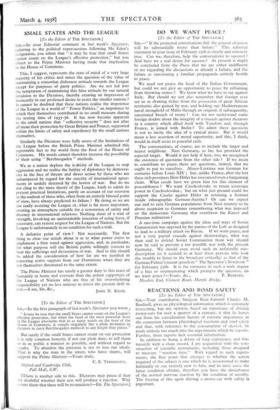SMALL STATES AND THE LEAGUE
[To the Editor of THE SPECTATOR.] SIR,—In your Editorial comment in last week's Spectator,
referring to the political repercussions following Mr. Eden's resignation, you admit that " it may be true that small States cannot count on the League's effective protection," but you object to the Prime Minister having made that implication
in the House of Commons.
This, I suggest, represents the state of mind of a very large majority of his critics and raises the question of the value of maintaining a somewhat dishonest attitude towards the League except for purposes of party politics. Are we not led into the temptation of maintaining this false attitude by our natural
revulsion to the Dictators, thereby creating an impression of insincerity in our professed desire to assist the smaller nations ? It cannot be doubted that these nations realise the impotence of the League in a world of " Power Politics," an impotence to which they themselves contributed in no small measure during
the testing time of 1935-36. It has now become apparent to the small nations that " collective security " does not after all mean their protection by Great Britain and France, supported within the limits of safety and expediency by the small nations themselves.
Similarly the Dictators were fully aware of the limitations of the League before the British Prime Minister admitted this regrettable fact to the world from the floor of the House of Commons. His words cannot therefore increase the possibility of their using " Berchtesgaden " methods.
We as a nation deplore the inability of the League to stop aggression and we realise the futility of diplomacy by democra- cies in the face of threats and direct action by those who are unhampered by regard for the sanctity of international agree- ments or unduly deterred by the horror of war. But do we not cling to the mere theory of the League, loath to admit its present practical limitations, partly on account of our aversion to the outlook of those who, often from an entirely biassed point of view, have always predicted its failure ? By doing so we are not really assisting the League or, what is far more important, creating an atmosphere suitable for a restoration of sanity and decency in international relations. Nothing short of a trial of strength, involving an unmistakable intention of using force, if necessary, can restore respect for the League of Nations. But the League is unfortunately in no condition for such a trial.
A defeatist point of view ? Not necessarily. The first thing to clear our minds about is as to what power exists to implement a firm stand against aggression, and, in particular, for what purpose will the British public willingly consent to bear the sufferings and devastation of war. And to this should be added the consideration of how far are we justified in expecting active support from our Dominions when they are not themselves threatened to the same extent.
The Prime Minister has surely a greater duty to this mass of humanity at home and overseas than the ardent supporters of the League of Nations who are free of his overwhelming responsibility yet no less anxious to arrest the present drift to war.—I am, Sir, &c.,
JOHN N. KNOX.






































































 Previous page
Previous page